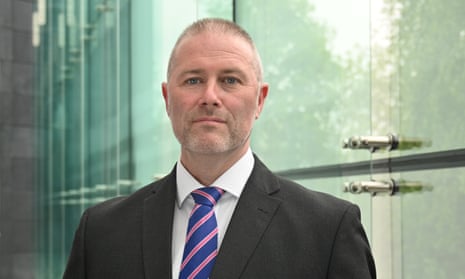The head of the Police Federation of England and Wales has said the Metropolitan police is institutionally racist, misogynistic and homophobic, becoming the first leader of a major British policing institution to accept the findings of a devastating report last month.
In an interview with the Guardian marking the 30th anniversary of Stephen Lawrence’s murder, Steve Hartshorn said he expected a “backlash” for his comments, which he stressed were his personal view.
Hartshorn was elected last year as chair of the federation, which represents more than 130,000 rank-and-file officers across England and Wales. He said making his views public was an act of “leadership”, with policing needing a “mindset shift” to move on from race problems that had dogged it for decades.
He blamed leadership from police chiefs for the failure to make more progress and said frontline officers – seen by some as part of the problem – should with “pride” be “part of a different future”.
An inquiry by Sir William Macpherson into the failings that left the racist killers of Lawrence free was the first official report to find the Met guilty of institutional racism, in 1999.
Almost a quarter of a century later, Louise Casey reached the same conclusion in a report published last month – but it was not accepted in full by the Met commissioner, Sir Mark Rowley, who claimed “institutional” was ambiguous and a political term. Police chiefs last year decided against accepting the term.
Asked if he accepted Casey’s key findings about bias being institutional in the Met, Hartshorn said: “For me, I personally do accept the findings in the report.”
Casey heard testimony from officers who had suffered at the hands of their colleagues, with supervisors too often turning a blind eye, or worse.
Hartshorn said: “I represent lots of those people that have come forward to speak. Some of my colleagues will probably not like the fact that I’m accepting there are institutional failings and biases within such a massive organisation.
“But then many will, and [will] go: ‘Well, what’s the harm in accepting it if we understand that it’s not labelling every officer as institutionally racist, sexist, homophobic, corrupt?’”
He added: “It’s not labelling every police officer as racist, sexist, homophobic – far from it. You just say that these poor practices and certain behaviours must change so we can understand people’s negative lived experiences to get better and improve on that. And that, in turn, should give confidence that policing is part of the community and hopefully start to reassure the public that we are listening.”
Rowley’s decision not to accept his force was institutionally biased has caused disquiet and, for some, undermined his promise that he is committed to genuine change after repeated critical reports.
Hartshorn said that sweepings changes needed to be “embedded to make sure that we’re not here again in five or 10 years’ time going: well, we had Casey in 2023, what’s changed?”
Hartshorn said most officers wanted to do good and said policing was still an amazing career, adding that he wanted the federation to be “credible as the voice of every rank-and-file office in the country and say: there are institutional failings, not just in policing but in government and other institutions, but we are better than that, and let’s prove it”.
after newsletter promotion
He added: “Let’s accept that if we’ve made mistakes in the past, or we haven’t challenged things that are clearly inappropriate. We can do now with pride, to say: yeah, I accept the failings but I now want to be part of a different future.”
Hartshorn said reading every page of Casey’s report and listening to people such as Mina Smallman, whose murdered daughters were photographed by officers, helped change his thinking, as had listening to the views of the former assistant commissioner Neil Basu.
Basu, who rose to become head of counter-terrorism, once commanded the firearms command in which Hartshorn served, and changed his views about institutional racism after the 2020 murder of George Floyd in the US and subsequent Black Lives Matter protests.
Hartshorn said: “Acceptance is the first step to moving on.”
Some police chiefs fear that the rank and file, whom Hartshorn leads, resent the institutional label. Hartshorn said: “Yes, I understand that. That’s why I stressed [these] are my personal views because I know with a headline that PFEW [police federation of England and Wales] chair accepts institutional racism, I could face a very big personal backlash myself.
“For me, it’s about leadership. It’s about being true to who I am and what I believe.”
He said the chiefs needed to accept the report and its painful findings but said it was a “massive concern” for him that some were allegedly claiming the issues in the report were isolated in the Met and not problems blighting their own force.
“You might not have a [David] Carrick or a [Wayne] Couzens, but you still will have people who are probably close to that.”
Hartshorn added: “There’s been clear failings in leadership … to address the very issues that should have been dealt with, and consigned to history.
“It could be argued that, yes, it manifestly has got worse because, you know, 25-30 years on, things don’t seem to improve and we’re still having these horrendous issues.
“If it’s institutional failings of racism, sexism, homophobia, that has to sit at levels of senior leadership throughout the organisation.”
